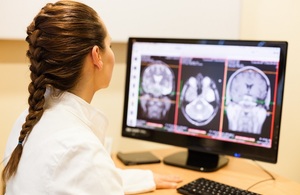Secretary of State visits Warwickshire health and care services
Patients across Warwickshire are benefiting from the use of innovative digital health technologies and the opening of a new community diagnostics centre to improve access to services and bust the COVID backlogs.

- Health and Social Care Secretary, Steve Barclay, thanked NHS staff at 2 sites in Warwickshire for their unwavering work busting the COVID backlogs
- He visited the new community diagnostic centre (CDC) at George Eliot Hospital that will further support people access tests and scans locally and more rapidly
- Visit highlights continued commitment to ensure patients can get timely, quality care from the NHS
Patients across Warwickshire are benefiting from use of innovative digital health technologies and the opening of a new CDC to improve access to services and bust the COVID backlogs.
The George Eliot Hospital CDC, which will open mid August, will host a new X-ray suite and dedicated clinical areas, opening up capacity for up to 12,000 ultrasound scans and 19,000 X-rays each year. This will speed up appointment times so patients are able to access treatment quicker, easier and closer to home.
Visiting the region today (Friday 5 August) Health and Social Care Secretary, Steve Barclay, went to both the new George Eliot Hospital and Manor Park Surgery to thank NHS staff for their tireless efforts to provide care to their local communities.
Health and Social Care Secretary, Steve Barclay, said:
With the backlogs due to COVID it is vital that we innovate to speed up diagnosis and treatment. So it was great to see the state of the art new diagnostic centre in Nuneaton, which opens in 10 days time, and to discuss with local GPs how this will also help them deliver improved patient care.
Diagnostic one-stop shops, like the George Eliot Hospital, are right at the heart of local communities and are helping to speed up access to X-rays, lung function tests, ultrasound and endoscopy. By bringing under one roof cardiac and respiratory diagnosis with access to pathology investigations, it will allow patients to attend once rather than need repeat visits. It is also good for staff retention and progression to have these new facilities with state of the art equipment.
This, combined with other innovations in the region like remote monitoring at Manor Park Surgery are supporting the NHS on the biggest catch up programme in history.
The Health and Social Care Secretary also met with radiographers at the George Elliot hospital who are doing vital work carrying out diagnostic imaging and intervention procedures to bust the backlogs and ensure people are being seen quickly. Combined, CDCs in the Midlands region have delivered 257,239 tests between November 2021 and 17 July 2022 – which has helped thousands of people across the region to get tests earlier, speeding up diagnosis of a range of conditions from cancer to heart or lung disease, and enabling patients to access treatment faster.
At Manor Court Surgery in Nuneaton the Health and Social Care Secretary met dedicated staff to discuss what the surgery is doing to support patients. The practice, which forms part of the Nuneaton and Bedworth Primary Care Network, told the Secretary of State about their innovative use of remote monitoring to better support patients in care homes and those with long term conditions. Remote monitoring, where patients monitor their condition via technology and feed back to their doctor from home, both improves patient experience, by receiving the care they need from their home, and frees up valuable time.
Over 280,000 people have already used remote monitoring at home and in care homes across the country in the last year, and increasing the availability of remote monitoring across the country could support a further 500,000 people receive personalised care from home by March 2023.
Dr Catherine Free, Chief Medical Officer at George Eliot Hospital, said:
By putting X-rays, scans and other tests for a large range of conditions in the same location we can begin to provide a one-stop service for patients to improve patient experience and reduce the time people wait between appointments.
The need for tests to help diagnose and treat patients is forecast to increase so we need to ensure we have the right facilities to meet the demand.
This is the first phase of the project and we are waiting to hear confirmation of funding to complete the second phase of the project which will bring CT and MRI scans and all the tests for cancer under one roof, improving outcomes for patients with cancer and other serious conditions.
Backed by £2.3 billion, up to 160 CDCs will be rolled out across the country by 2025, delivering 9 million tests and checks a year.
Over 90 CDCs are already open across England and have delivered over 1.5 million checks – including over 700,000 additional CT, MRI, ultrasound, endoscopy and ultrasound tests, with around 30,000 tests a week.
As a result, good progress towards reducing the longest waits is already being made – the number of patients waiting over 2 years for treatment falling by more than 80% since February.
Over the next 3 years, a record £39 billion will be invested in the health and social care system to ensure it has the long-term resource it needs while working to bust the COVID backlogs, reducing patient waiting times and speeding up diagnoses.